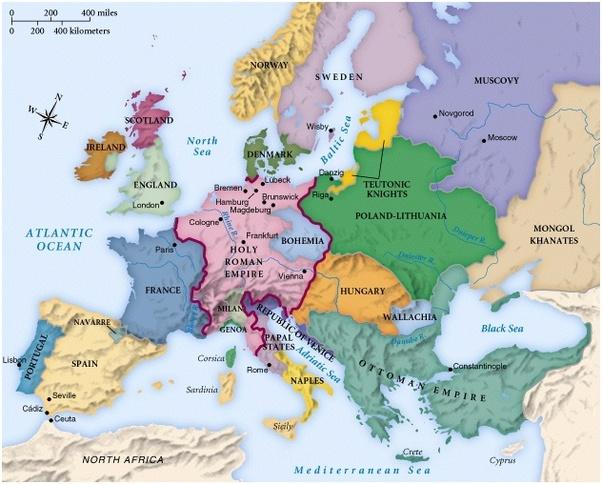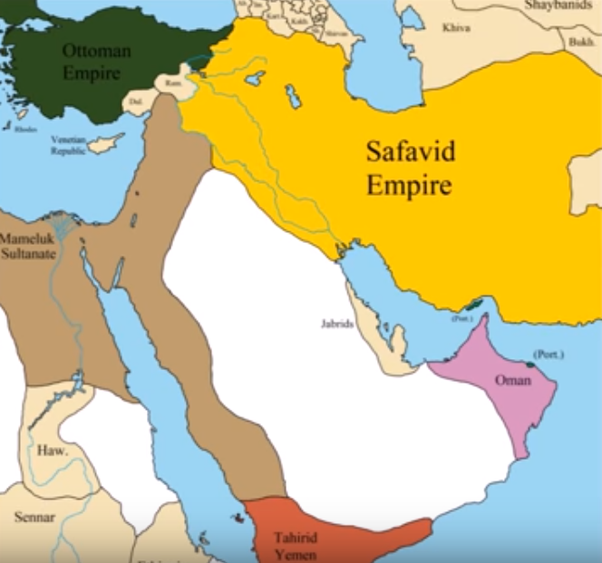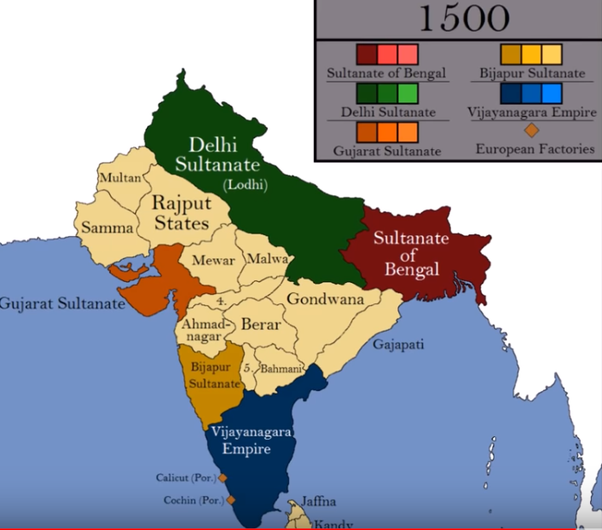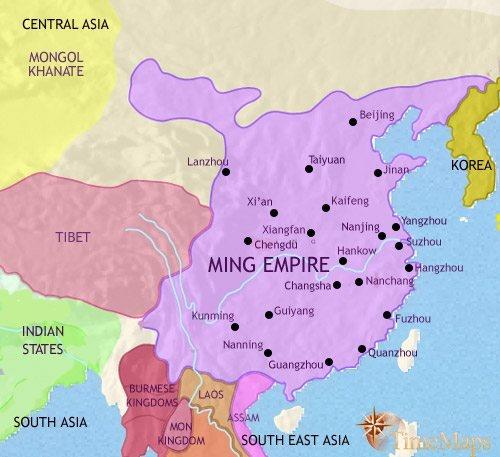In the 1300s the black plague hit Europe and that caused great change in medieval societies. Because so many people died, there weren’t as much workforce as before and that gave the peasants and serfs a lot more power. The noblemen still needed people to work their lands, but now you had to pay the laborers better, because if they left, there was nobody to take their place.
Another reason for Europe’s rise is geography. Europe has many peninsulas, bays and rivers, so shipbuilding and sailing are important. Also another reason that is maybe more important is that western Europe specifically is in itself a peninsula of the larger Eurasian continent. That means that the west is far away from the Central Asian steppe and is safe from the invading steppe nomads. Some nomadic invasions were extremely destructive and had a negative impact on the development of effected areas. A good example of those are the infamous Mongol invasions. The Mongol sack of Baghdad ended the Islamic Golden Age and they destroyed the advanced Song dynasty of China. Western Europe was speared from that. As the Mongol Empire collapsed the Middle East and Far East became dominated by conservative and isolationist dynasties, Europe began the age of exploration and science. There has been other nomadic invaders too, such as the Seljuks and Timurids. Some steppe invaders managed to found new ruling dynasties in countries they took over. In China the Mongols founded the Yuan and Manchus the Jinn and Qing. Some of these dynasties were relatively successful, like China under the Qing rule, although the time of the late Qing was humiliating. During that time China stabilized and the population grew significantly. While other people fought a lot of nomadic cavalry, the Europeans fought a lot of infantry. Early gunpowder weapons were the most effective against mass infantry formations and that is why Europe became the source of the best muskets. Cannons were good siege weapons, but they aren’t necessary against nomads, who have few cities to besiege.
Europe in the late medieval and early modern eras was a divided continent, which created competition and only the most powerful and innovative countries could survive and elsewhere in the world there were only a few big empires, which created a lack of competition. This is often stated as the reason why Europe became so dominant. I think that it’s not so simple, because China is really the only place that has often been ruled by a one big empire. Middle East and India have been a collection of kingdoms most of their histories. During the 16th century when Europeans were exploring and colonizing, most of the Middle East was conquered by the Ottomans and India by the Mughals. The Ottomans were constantly fighting someone bordering their large empire. The Mughal Empire on was the largest economy in the world in 1707 and then within 50 years the empire had shrank into a vassalized city state. There couldn’t have been a lack of competition if that happened, though competition just wasn’t as strong as in Europe. The lack of conflict only really impacted in China and Japan. The better reason for the rise of Europe are the naval and gunpowder focus, resources from colonies and constant continent wide wars during the 18th century. Europe finally became superior when industrialization began. Asian dynasties, such as the Song and the Mughals could have industrialized too, even before Europe, but they fell before achieving that.
Europe, Middle East, India and China around the year 1500. Only China looks to be very unified.
To understand why the European great powers were successful, we have have to look why other great powers failed. In the 16th and 17th centuries the large countries outside of the Christian Europe were the Ottoman Empire, Safavid Persia, Mughal Empire, Ming/Qing China, Tokugawa Japan and Joseon Korea. Of those the Ottomans the Mughals, the Qing and to some extent the Safavids were of Steppe origin.
Ottomans descended from the Turkic people who had entered Anatolia during the 11th century. Their army had large amounts of cavalry and many shallow water galleys, but a small high seas fleet. Also the Ottomans had no ruler who modernized the country, like Peter the Great of Russia and Ottoman Empire had expanded into a massive overextended country. The first Ottoman heirs were sent to govern provinces to learn statecraft, but the later heirs were kept in the capital under strict surveillance in a so called ‘Golden Cage’. That’s why the late sultans were less capable. Furthermore the government was influenced by conservative ministers and religious officials opposing modernization. The Mughals under the command of Babur, a distant relative of Genghis Khan, came from central Asia with nomadic cavalry and musketeers and conquered most of India. They had brought gunpowder weapons to India, but were still cavalry focused. Soon the Mughals had no large and threatening opponents in India and they had become incredibly wealthy, so they had no incentive to develop more weaponry. Then in 1707 emperor Aurangzeb died and the empire began to collapse rapidly. This was exploited by the Maratha Empire and the British. The Mughal successors of Maratha Empire and the Kingdom of Mysore tried to catch up with the British. Mysore allied with the French and imported technology to begin to build a navy. The Marathas developed their artillery with European technology and tactics. The Safavid founder Ismail I was of Turkish, Azerbaijani and Georgian descent.
The Qing dynasty was established by the semi-nomadic Manchus who had even less interest in navies than the previous Ming dynasty, who had ended their era of sailing and given room for the European explorers to come a few decades later. The Chinese also had no incentive do develop, because of an illusion of invincibility, since all their neighbors seemed too weak to challenge them. During the 16th and 17th centuries the Chinese had defeated the Japanese invasion, Portuguese, Dutch and Russian forces and all other neighbors they had were small steppe- or jungle kingdoms. After the 17th century Qing conquest of China, relatively peaceful times followed and the Qing army became corrupt and less and less effective. The Europeans had to constantly develop new weapons during their many large wars during the 18th century. The Chinese didn’t need to, because the last war major war fought by the Chinese before the Opium wars was the revolt of the three Feudatories (1673–1681). The Qing fought wars after that, but they were against steppe nomads or small jungle kingdoms. Although some of these conflicts were destructive, they weren’t threatening the survival of China. Those dynasties ruling the Islamic world and China were of central Asian origin and were cavalry focused and not naval focused, like the Europeans. Only the Ottoman Empire had a proper navy, the Safavids and Mughals had small fleets to fight pirates, but they weren’t a mach for European navies.
China was an isolationist country from the 16th to 19th century, much like Japan and Korea. In the 1500s Europe had a lot of small warring kingdoms and so did Japan, and during this period the Japanese had developed good siege tactics and gunpowder weapons. The Japanese wars had been fought on land and so navies were mostly ignored. Then Japan was unified and they attempted an invasion of mainland Asia, but they were repulsed by China and Korea. After that Japan isolated itself and they hardy fought any wars, which stopped weapon development in its tracks.




